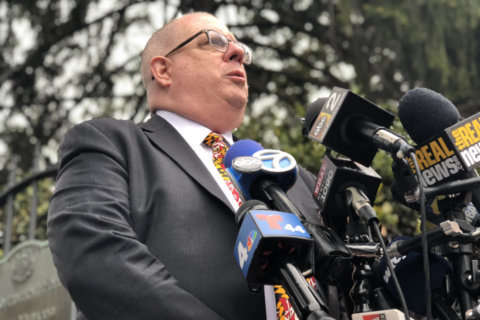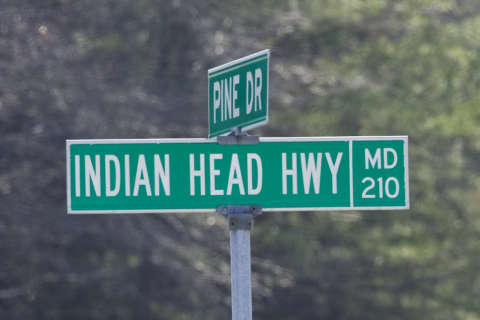WASHINGTON — Late Monday night, Maryland lawmakers approved legislation focused on a number of controversial issues, including school safety and gun control as the Maryland General Assembly wrapped up an unusually productive 90-day legislative session.
All told, more than 3,000 bills were filed during the 90-day session. Here’s a look at a few of them.
School safety
An initiative aimed at school safety made it past both chambers. Public schools will now be required to have a school resource officer or law enforcement coverage.
This will go into effect for high schools next school year. Middle and elementary schools have until 2019 to comply.
A total of $10 million will go toward funding the safety officers.
The issue of school safety drew attention in the General Assembly following the February school shooting in Parkland, Florida, and intensified after the March 20 shooting at Great Mills High High School, in St. Mary’s County.
Metro funding
This session, lawmakers also cleared the way for a dedicated stream of funding for Metro for the first time ever.
Maryland legislators agreed to an annual contribution of $167 million to support Metro. The decision comes after an agreement with Virginia and D.C. to contribute a total of $500 million a year in dedicated funding.
D.C. is planning to kick in a total of $178 million and Virginia is planning to chip in $154 million as part of the agreement.
However, a final vote in Virginia is still needed to confirm the source of the new funding. That vote is expected by April 18.
Speed cameras on deadly stretch of Md. highway
There will also be a new speed camera along a stretch of Indian Head Highway where 58 people have been killed between 2007 and 2017. The General Assembly approved the bill allowing speed cameras on Md. Route 210 southbound at Old Fort Road with hopes of slowing down drivers on the high-speed highway.
Most of the traffic fatalities on the road were not in construction work zones or in school zones but on straightaway areas of the highway. That meant that officials required legislative approval before installing speed cameras there.
Protective orders and guns
Lawmakers also engaged in a heated discussion about protective orders and guns. House Bill 1302, also known as a “red flag” law, allows guns to be removed from anyone the courts say poses a danger to themselves or others.
Opponents argued the law targets gun owners, but supporters said families of suicide victims strongly supported the legislation. While some legislators called for more time to review the details of the bill, it passed 93 to 46.
Five other states already have “lethal violence protective orders,” allow authorities to seize guns. Similar legislation is being crafted in D.C. and 18 other states.
The bill’s backer, Del. Geraldine Valentino-Smith, a Democrat who represents Prince George’s County, said the bill would also help prevent domestic tragedies, such as the shooting death of Candace Carnathan, who was fatally shot by her husband earlier this year just a day after she sought a protective order against him.
The General Assembly also approved a separate measure requiring convicted domestic abusers to surrender their guns.
Crime legislation
The General Assembly OK’d a handful of measures related to fighting crime.
Measures to expand prosecutors’ wiretapping authorities on gun investigations, increased penalties for witness intimidation and making it easier to prosecute volume dealers of the deadly opioid, fentanyl, were all approved by lawmakers.
Another measure approved adds $3.6 million to Baltimore’s “Safe Streets” program.
Stricter proposed sentencing guidelines were jettisoned after strong criticism from criminal justice reform advocates.
Fighting sexual harassment
Lawmakers approved a new process for handling sexual harassment complaints in the statehouse.
Going forward, an independent investigator will look into complaints against legislators and lobbyists. The measure also prevents taxpayer money from being used to settle a lawsuit involving sexual harassment.
The bill comes amid the #MeToo movement. Earlier this year, the Women’s Caucus released a report detailing graphic accounts of sexual harassment reported by the lawmakers, lobbyists and staff members in Annapolis.
Budget boosts for schools, environment, opiods
Md. Gov Larry Hogan touted a record $6.5 billion in funding for K-12 education and included $13.7 million to fight the opioid crisis. The state continued to fund efforts to clean up the Chesapeake by allocating more than $52 million to the The Chesapeake and Atlantic Coastal Bays 2010 Trust Fund. The governor’s budget also allocated $11.5 billion for Maryland’s Medicaid program.
Federal and state tax changes
Tax-relief legislation increases the maximum standard deduction to $2,500 for single taxpayers and $5,000 for those filing jointly (SB 318), in tax years 2018 through 2020, according to a state analysis. In January, Comptroller Peter Franchot explained a national tax overhaul, which touts savings for Maryland taxpayers of $2.8 billion on the federal side, would also increase state and local taxes for many Marylanders, according to a state report. Hogan proposed legislation (SB 733/HB 875) that would encourage standard deductions for federal taxes while allowing taxpayers to itemize state and local taxes. That bill failed.
Forest conservation, oysters, climate alliance
A bill (SB610) that would have strengthened replanting requirements for developers under the state’s Forest Conservation Act was stripped of its teeth. The amended measure creates a task force to study forests in Maryland. And lawmakers passed a bill (HB572) that will increase tax credits for restaurants to recycle oyster shells. The Democrat-controlled legislature also passed a bill (HB 3) that will require Hogan to include Maryland in the U.S. Climate Alliance — a coalition of governors committed to reducing greenhouse gas emissions. Republican President Donald Trump withdrew the U.S. from the Paris Climate Agreement in June.
Opioids: Funding, overdoses
The Maryland General Assembly targeted “pill mill” doctors — physicians who unscrupulously supply opioid prescriptions — by passing a bill (HB 359) requiring the state’s health department to establish a tip line to report suspicious prescribing practices and to examine the prescription and treatment history of those who died from opioid overdoses.
Health: Insurance, tobacco
Bills to stabilize the insurance market (SB 1267/ HB 1795) passed, with the governor’s support, to counterbalance recent health care decisions at the federal level. The two measures focused on applying for a federal-funds waiver and creating a reinsurance pool based on approval of the waiver. A bill also passed that prohibits and penalizes distribution of electronic nicotine delivery systems to minors (HB 1094). Legislation that allows the holder of an electronic nicotine delivery systems retailer license to make sales through the mail (HB47/SB90) passed.
Other matters of note that passed in the 2018 General Assembly session include:
- Hemp: Legalization of an industrial hemp pilot program passed this session. It’s main uses are for fiber, fuel, food and medicine. (HB 698/SB 1201)
- Divorce: A court will be able to allow divorce on the grounds of mutual consent if the parties have minor children. Sponsor Bobby Zirkin, D-Baltimore County, said the measure helps to eliminate a drawn-out process of divorce that can take years to conclude.
- Pink hunting gear: A bill (SB 341/HB 1118) adds bright pink as an approved color for hunting gear in Maryland.
- Richard Collins scholarship: After Bowie State University student Richard Collins III was fatally stabbed in May on the University of Maryland, College Park campus, the state’s General Assembly created a scholarship in his honor for minority students in ROTC programs at historically black colleges or universities (SB 1202). Prior to his death, Collins had been commissioned into the U.S. Army as a second lieutenant.
- Gay conversion: Delegate Meagan Simonaire, R-Anne Arundel, who will not run for re-election, opened up about her sexuality when discussing a bill that bans conversion therapy for minors (SB1028). She discussed how her parents — including Sen. Bryan Simonaire, R-Anne Arundel, who argued passionately against the bill — wanted to put her through the therapy when she opened up to them. The legislation passed in both chambers.
WTOP’s Melissa Howell, Jack Moore and The Associated Press contributed to this report.







